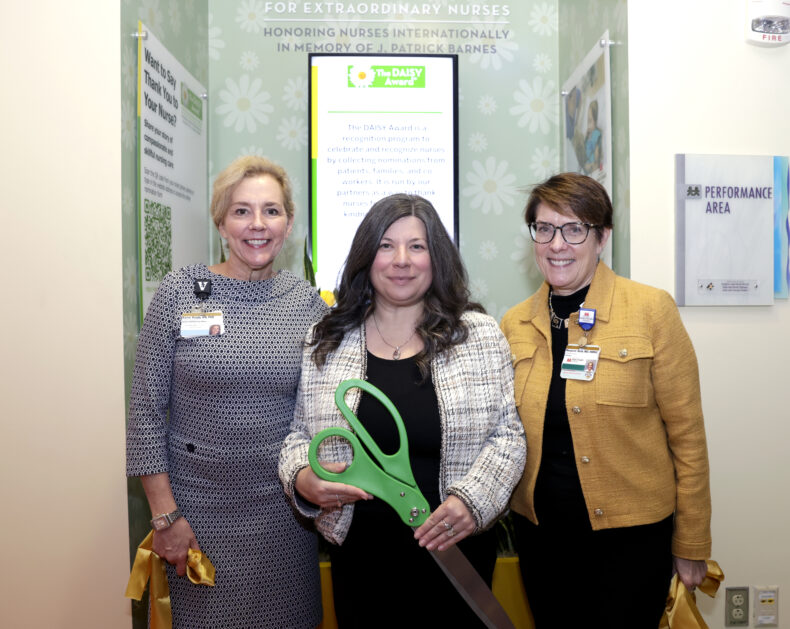Gretchen McCullough, MSN, RN, NEA-BC, Chief Nursing Officer, Monroe Carell Jr. Children’s Hospital at Vanderbilt, and Matt Scanlan, JD, Vice President, Office of State Government and Community Affairs, presented at Nursing Grand Rounds a panel educating Vanderbilt Health nursing staff in methods to engage in health policy development professionally and within their community.
McCullough opened the panel, “Nurses as Advocates: Influencing Health Policy,” introducing the purpose and important impact nurse advocacy can make in health policy in all levels of government.
“Nurses make up the largest percentage of health care workers in the U.S. and internationally. Seventy-eight percent of adults find nurses to be highly honest and trusted. As professionals, leveraging that public trust in a meaningful way empowers us to become advocates,” said McCullough.
She addressed factors impeding nurses’ ability to get involved in advocacy, including a lack of advocacy education during nursing school and throughout the course of nurses’ careers, reduced importance of advocacy as a job responsibility, and lack of involvement in community advocacy networks.
“We know that there are perceived barriers in the space of nurses as advocates that feel difficult to navigate through, but working toward meaningful policy advocacy is an act of loving education and kindness to your community,” said McCullough.
“Think about the things that matter most to you in your work. Maybe it’s access to care for vulnerable patients, maybe it’s the ability to teach students. Whatever gives you joy in your daily connection to your practice as a nurse, there is a policy that is influencing your ability to do that work meaningfully.”
She shared the importance of understanding how policies are developed and staying updated on current policy issues.
To combat those perceived barriers, McCullough shared resources that educate and engage individuals in advocacy efforts through community and government organizations.
For nurses looking to pursue more advocacy opportunities, McCullough encouraged individuals to connect to professional organizations and coalitions as well as advocate within their local communities by joining non-nursing affiliated professional organizations.
“There is such value in the work nurses can do on non-nursing and non-health care boards around the U.S. I want you to imagine a world where every organization always has a nurse actively on that board. How many public interests would we impact nationally with that presence?” said McCullough.
Scanlan ushered in the second half of the panel explaining the governmental procedure for health policy development in the Tennessee General Assembly, his team’s role in health policy development, and how they can be a resource to nurses looking to engage as advocates.
“We work toward building trust and respect with lawmakers to end up with laws that assist in making improvements in how people can do their jobs. Our capital to do that is based on your knowledge and our ability to help legislators to pass bills,” said Scanlan.
Scanlan said knowledge capital comes from advocacy and being a resource to nurses who are interested in engaging in policy through VUMC or individually.
“Our team is there to help act as a guide to those of you interested in advocating, to help navigate and reach the goals you’d like to achieve in making policy change on issues that are important to you,” said Scanlan.
He clarified the guidelines of VUMC policy regarding lobbying with government officials for policy change when operating under your VUMC title versus expressing an individual opinion on behalf of outside organization.
Scanlan closed the panel by encouraging all nurses interested in health policy advocacy to reach out to his office.
“We are always happy to discuss how to get everyone involved in government affairs. When people share their stories and opinions, important things happen. They raise awareness of an internal policy issue we can address; they bring a topic to the table we can add to our legislative agenda, or we can guide you in getting connected to the right legislator and committee members to help you succeed in your personal advocacy activities,” said Scanlan.
Nurses attending the panel felt empowered by the education and opportunities presented.
Katrina Brown, MSN, CEN, sexual assault nurse examiner team lead, who attended the panel said, “I’m excited that this is a vehicle to enable nurses at VUMC to participate in advocacy opportunities. Providing this platform feels that we’re being actively encouraged and equipped to becomes advocates for our patients in and outside of VUMC.”
Links shared during the presentation can be accessed here:
Government
Tennessee General Assembly Legislation
Tennessee General Assembly House of Representatives
United States House of Representatives
Professional nursing organizations and coalitions
American Association of College of Nurses
American Organization for Nursing Leadership
Tennessee Hospital Association
Children’s Hospital Association











